
Attending the workshop, on the side of VNU, there were VNU President Nguyen Kim Son, Prof. Dr. Nguyen Van Kim (Party Secretary, Vice Rector of the University of Social Sciences and Humanities), Dr. Nguyen Tho Duc (Director of the Institute of Chinese Studies, VNU).
On the side of the Thoai Khe Research Association, there were Mr. Lee Kwang-ho (President of the International Thoai Khe Association), Ms. Park Ke-Chin (Vietnam-Korea Cultural Research Center), Mr. Ryu Hang-ha (President of the Korean Chamber of Commerce and Industry in Vietnam), Mr. Song Jea-so (Director of the Thoai Khe Research Institute).
Ly Hoang (nicknamed Thoai Khe, 1501-1570), was a great cultural, educational and ideological figure in Korea in the 16th century. A famous Confucian scholar of the Choson Dynasty, Ly Thoai Khe was a scholar who devoted himself to in-depth research on Chu Tu Hoc. He is considered to have received, created and successfully conveyed the core and profound values of Confucianism, especially the profound philosophies in Confucian classics, into Choson society and academia. Today, although materialism and the 4.0 industrial revolution have greatly affected people's lives, the lessons of Thoai Khe still maintain their important position. The 27th International Conference on Confucianism and Ly Thoai Khe Studies was held to share thoughts and feelings about the life and great contributions of a cultural celebrity to the country of Korea.
In addition, from a comparative perspective, Vietnam and Korea are both influenced by Confucianism and share many common values of East Asian civilization. In terms of culture and education, in both Vietnam and Korea, Confucianism has contributed to building a learning society and to this day, many great legacies of that scholarship are still valuable assets in the cultural treasures of both countries. However, each country has its own way of selecting, absorbing and applying Confucian ideological and philosophical values about life and society. Therefore, this conference also aims to explore the similarities and differences in the historical and cultural development process between the two countries in relation to Confucian ideology.
On behalf of the conference organizing committee, Mr. Lee Kwang-ho (President of the International Thoai Khe Studies Association) introduced that the Korea Thoai Khe Philosophy Research Institute was established in 1970. To date, the Institute has published 143 issues of the research journal “Thoai Khe Studies”. Since 1976, the Institute has organized 26 international conferences on Thoai Khe Philosophy in many countries around the world such as the US, Germany, China, Russia, Japan, and Taiwan. This is the first time this conference has been held in Vietnam. Previously, there have been exchanges between Vietnam and Korea between the Center for Confucian Studies - Chungnam University, Dasan Cultural and Academic Foundation and the Vietnam Academy of Social Sciences. Therefore, he said that this conference is an opportunity for the two sides to learn from each other, a premise for active exchanges between Confucian thought in Vietnam and Korea.
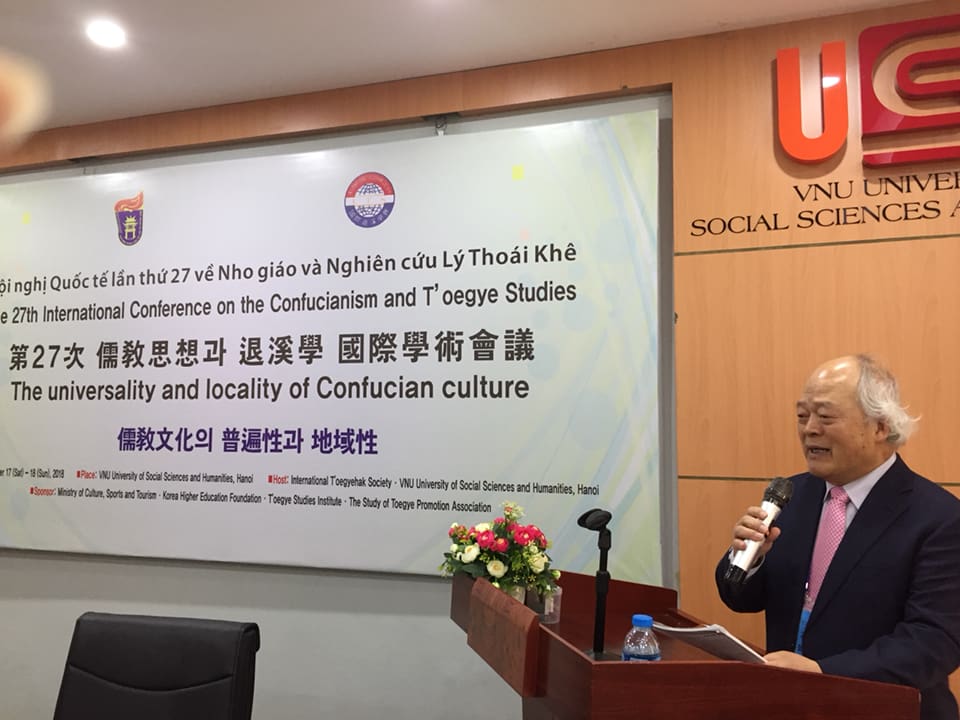
Mr. Lee Kwang-ho speaks at the conference
On behalf of the University of Social Sciences and Humanities, VNU, Prof. Dr. Nguyen Van Kim (Party Secretary, Vice Rector of the University) said that the cooperation between Vietnamese universities and international universities, research institutes and associations is increasingly expanding and achieving many important achievements. Therefore, this conference on Ly Thoai Khe is a good sign for the bilateral scientific cooperation between the two countries. The conference is an opportunity to promote understanding of the academic traditions and cultural depth of Vietnam and Korea. For the University of Social Sciences and Humanities in particular, this conference is a premise for future academic exchanges and cooperation between the University and Korean research units on Ly Thoai Khe.
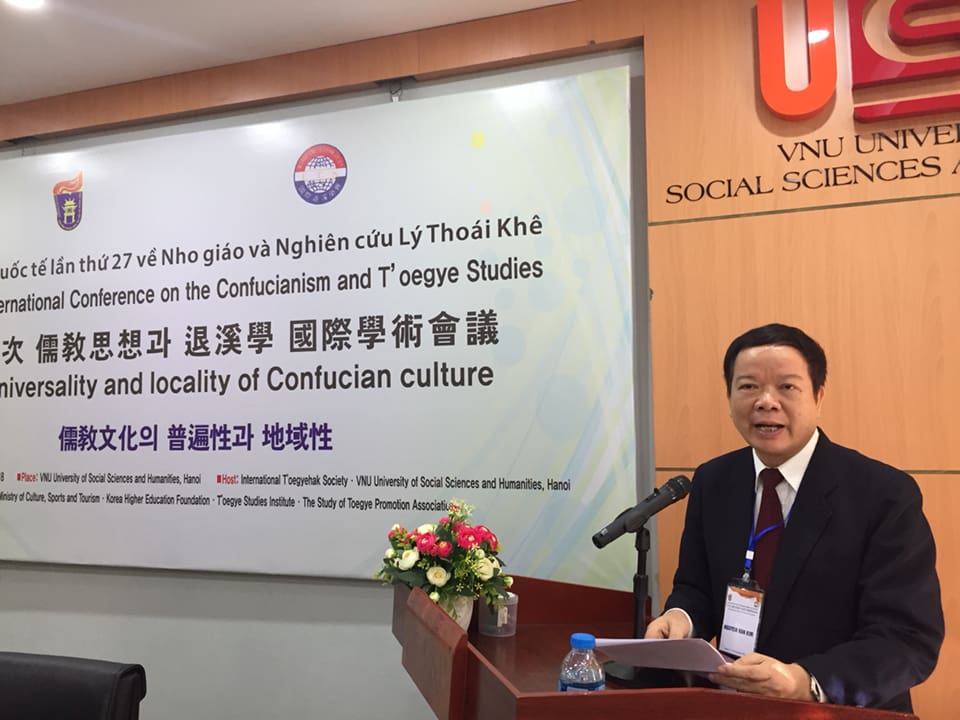
Prof. Dr. Nguyen Van Kim speaks at the conference
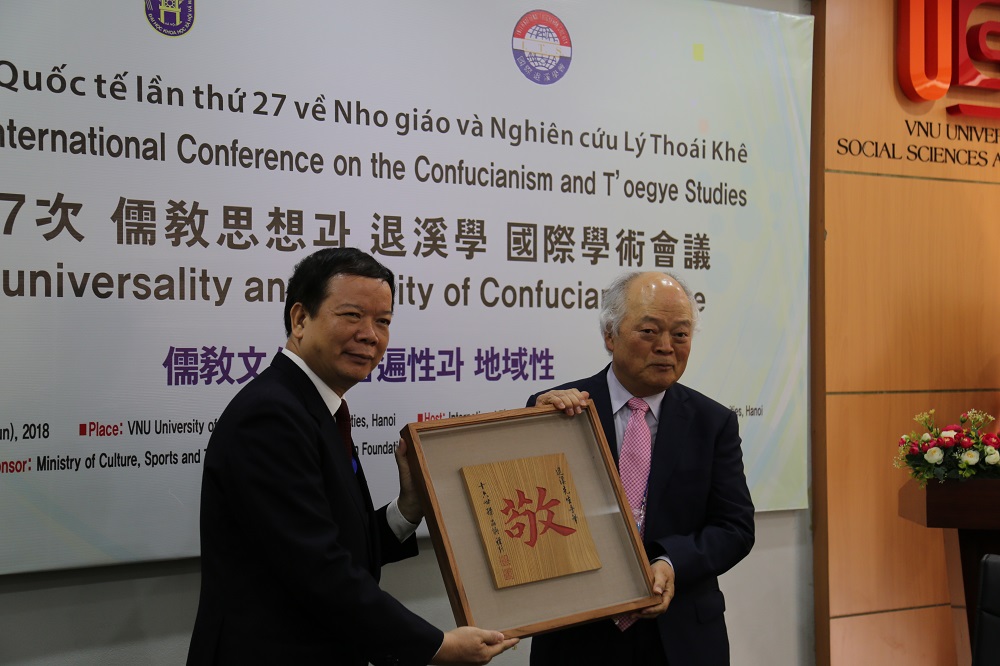
Prof. Dr. Nguyen Van Kim received a souvenir from Mr. Lee Kwang-ho
On behalf of the Korean government, Mr. Do Jong-Hwan (Minister of Culture, Sports and Tourism of Korea) sent a congratulatory speech to the conference. He highly appreciated the significance of the conference as it was held for the first time in Vietnam. He hoped that the conference would contribute to the analysis of Confucian values and the wider dissemination of Thoai Khe philosophy. The Korean Ministry of Culture, Sports and Tourism will do its best to promote the cause of personality education, culture, and humanistic spirit.
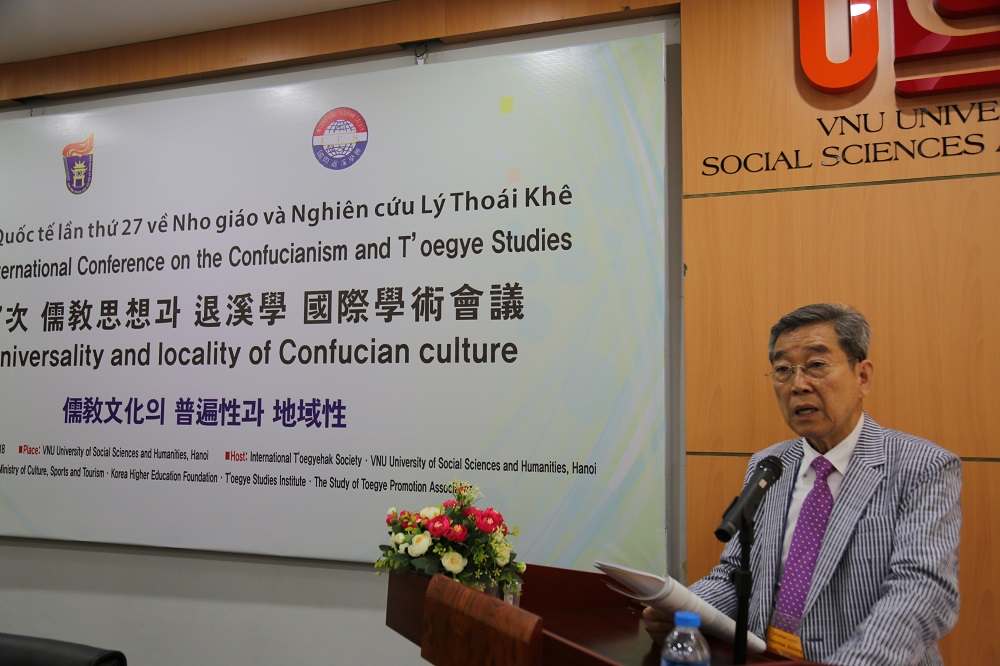
Minister Do Jong-Hwan speaks at the conference
On behalf of the Institute of Thoai Khe Studies, Mr. Song Jae So (Director) said that since ancient times, Vietnam and Korea have had similar cultures in terms of writing and regime. In the past, there was a lively exchange between intellectuals of the two countries on their diplomatic missions to China, such as between Le Quy Don and Joseon envoys during the Dong Chi trip in 1970. In modern times, when Vietnam and Korea both experienced the colonial period of France and Japan, President Ho Chi Minh and the communists of the neighboring countries came into contact with each other. In 1992, Korea and Vietnam established diplomatic relations and became important economic partners. He hoped that this conference would be an opportunity to further strengthen the bilateral friendship between Vietnam and Korea on the basis of cultural identity.
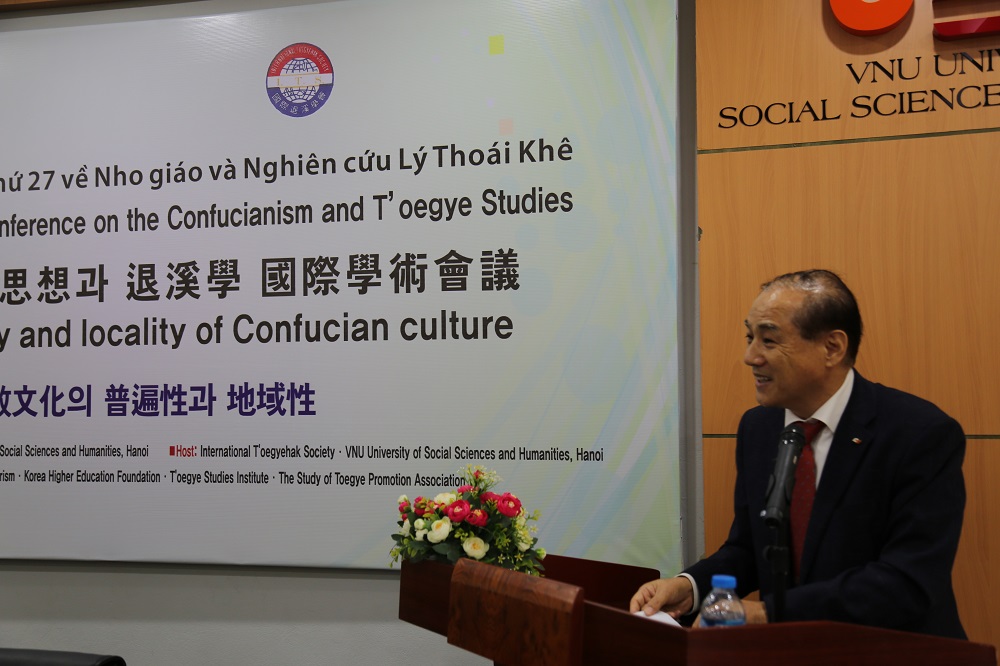
Mr. Song Jae So speaks at the conference
Next, the conference heard three introductory reports:
- The report “Confucianism and the 4.0 Industrial Revolution” by Associate Professor, Dr. Nguyen Kim Son (Director of VNU) points out some positive and sustainable points of Confucianism in relation to the challenges and risks of the 4.0 industrial revolution. Thereby, the author proposes the possibility of promoting those sustainable values, in order to limit the negative impacts of this revolution; increase the human factor, continue to develop people and human values in the new era.
- The report “A Modern Perspective on the Controversy Concerning the Four Realms and Seven Emotions: A Comparative Study of the Moral Psychology of Lee Hwang and Gi Dae-seung” by Dr. Jee Loo Liu (California State University, Fullerton) distills important issues in the two opposing views of Lee Hwang and Gi Dae-seung, two figures who had great influence on the history of Korean Confucian thought.
- The report “Reflections on the Universality and Specificity of Confucianism” by Mr. Lee Kwang-ho (President of the International Confucianism Association) compared the common features of Confucianism through classic works such as the Six Classics and the Four Books with the unique features in each context and locality, especially in Westernized societies with deep penetration of Western science and technology. Through that, the report aims to create a deeper and more accurate insight for Confucianism researchers.

Associate Professor, Dr. Nguyen Kim Son speaking at the conference
After the opening session, the workshop was divided into two sub-committees:
Panel A with presentations such as "Thoai Khe Ly Hoang - Eco-spiritualist, poet-philosopher, "loving people with respect to heaven" by Kang Heui-bok (Yonsei University, Korea); "Research and inheritance of Ly Hoang's 'family rituals'" by Lee Bong-kyoo (Inha University, Korea); "The ultimate orientation of Thoai Khe's theory of Qi" by Yang Zhucai (Nanchang University, China); "Ly Thoai Khe and Eastern studies, 'Heaven' in Taoism" by Pyon Yong-ho (Tsuru University, Japan).
Panel B with papers such as “Two paths of “self-enlarging” - On the views of the Confucian sage and the views of modern people” by Kim Hyoung-chan (Korea University, Korea); “Models and human moral enlightenment in Mencius’s Gaozi Shang” by Tim Connolly (East Stroudsburg University, USA); “Survey on the concept of Taoism of Thoai Khe” by Vladimir Glomb (Freie University Berlin), “Dai Hoc Do of Ly Thoai Khe (Korea) and Dai Hoc Do Theory of Nhu Ba Si (Vietnam) by Dinh Thanh Hieu (University of Social Sciences and Humanities).
Author:Tran Minh
Newer news
Older news